ALL BUSINESS
COMIDA
DIRECTORIES
ENTERTAINMENT
FINER THINGS
FREE CREATOR TOOLS
HEALTH
MARKETPLACE
MEMBER's ONLY
MONEY MATTER$
MOTIVATIONAL
NEWS & WEATHER
TECHNOLOGIA
TV NETWORKS
VIDEOS
VOTE USA 2026/2028
INVESTOR RELATIONS
ALL BUSINESS
COMIDA
DIRECTORIES
ENTERTAINMENT
FINER THINGS
FREE CREATOR TOOLS
HEALTH
MARKETPLACE
MEMBER's ONLY
MONEY MATTER$
MOTIVATIONAL
NEWS & WEATHER
TECHNOLOGIA
TV NETWORKS
VIDEOS
VOTE USA 2026/2028
INVESTOR RELATIONS
Posted by - Latinos MediaSyndication -
on - April 8, 2023 -
Filed in - Marketing -
-
560 Views - 0 Comments - 0 Likes - 0 Reviews
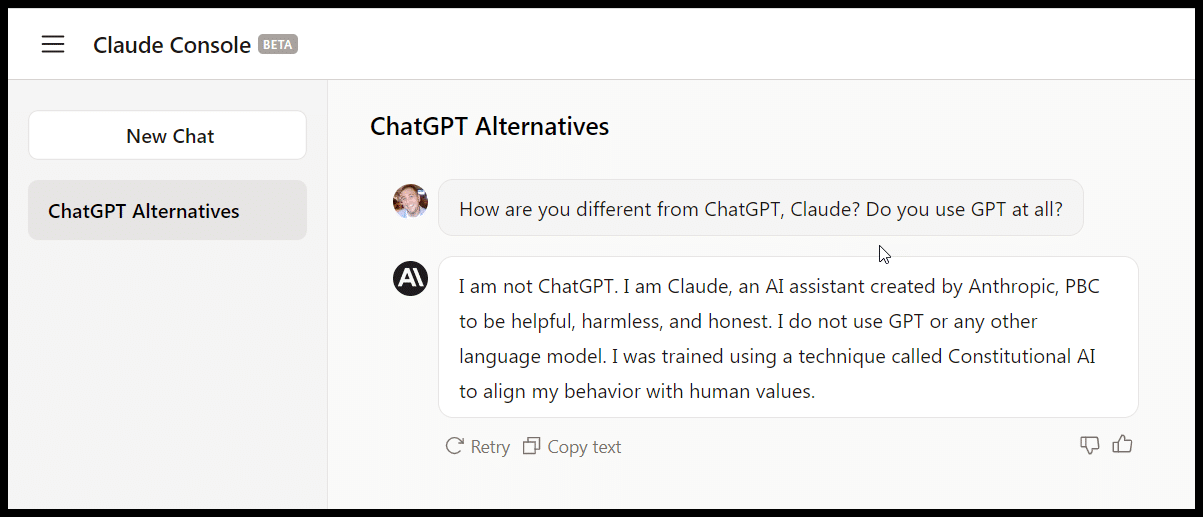
I’ve been excited about ChatGPT, its API, and its SEO applications – everything from local SEO to title tags and content editing. And like many (including OpenAI’s founder), I’ve also seen its limitations.
While ChatGPT is remarkable, once you’ve used it long enough, you likely know the following:
You may be looking for a ChatGPT alternative for all of these reasons. If that’s the case, you’re in luck because tons of investment is going into generative AI.
This article looks at 21 alternatives to ChatGPT, describing each product, who may want to check it out and why.
The best ChatGPT alternativesAn important thing to remember as you go through this list: these products are at very early developmental stages.
Some will rapidly develop and improve, a few will be shut down, and others will pivot away entirely from what they’re doing now.
I’d recommend trying them out for the specific function you’re using ChatGPT for now or would like to use ChatGPT for but haven’t had success with and see how they fit your own process.
Generally, in this article, I’m comparing ChatGPT “out of the box” in the web interface as it is currently constituted.
OpenAI recently announced plugins for ChatGPT (including a browser plugin), which may start to bridge the gap between ChatGPT and some of these alternatives.
If you have some coding ability, you may be able to change the difference in capabilities by leveraging those and the ChatGPT API.
1. Claude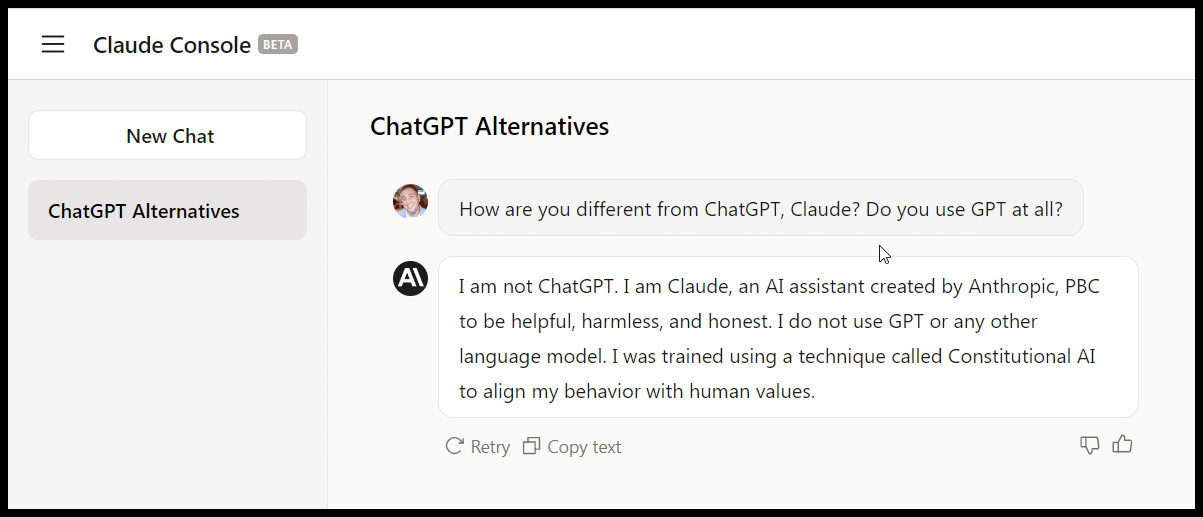
Claude describes itself as an “AI assistant” and is an AI chat platform similar to ChatGPT. It’s built on a different model called Constitutional AI.
Why should you care?Claude is designed by former OpenAI engineers and is made by Anthropic, a company with over a billion in funding.
One of the investors on that list is Google. If you’re interested in AI and ChatGPT alternatives, I’d generally say that anything Google and Microsoft do is worth watching and checking out.
Additionally, Claude makes two claims that – if true – are worth caring about:
These things are difficult to evaluate in a quantifiable way, but if true both would be important.
Who is it for?Generally, Claude can perform the same basic functionality as ChatGPT, but if you’ve used ChatGPT and have the following frustrations:
Claude is worth testing out for you as its explicit aim is to address these issues.
2. Google Bard AI
Bard AI is a conversational AI similar to ChatGPT built on a different large language model (LLM).
Why should you care?Bard is Google’s answer to ChatGPT and Bing AI chat. Again, anything Google and Microsoft are doing in this space will likely be worth noting.
Additionally, Bard is developed on top of a different large language model than GPT.
GPT powers many new AI tools, so those built on top of other models are worth noting, given that their LLM may be superior and lead to better or different capabilities.
Bard also has access to real-time data and the web, which differentiates it from ChatGPT.
Who is it for?If ChatGPT’s inability to access real-time data is a limiting factor for you, Bard is worth checking out.
If you need up-to-date information or statistics for content creation, want analysis done on live web pages, etc.
3. Bing AI Chat
Bing AI Chat is a Microsoft (a major stakeholder in OpenAI, which owns ChatGPT) conversational chat product with access to the live internet and is built on GPT.
Why should you care?Given Microsoft’s relationship with OpenAI and the combination of the GPT framework and live access to the web via Bing’s search capabilities, Bing AI Chat is worth paying attention to.
Who is it for?If you’re looking for real-time data and particularly want citations with that data so you can see sources and the sites that the data comes from (to do things like build listicle, add citations to content, vet AI-generated information), Bing Chat is an interesting alternative to both ChatGPT and Google Bard.
4. ChatSonic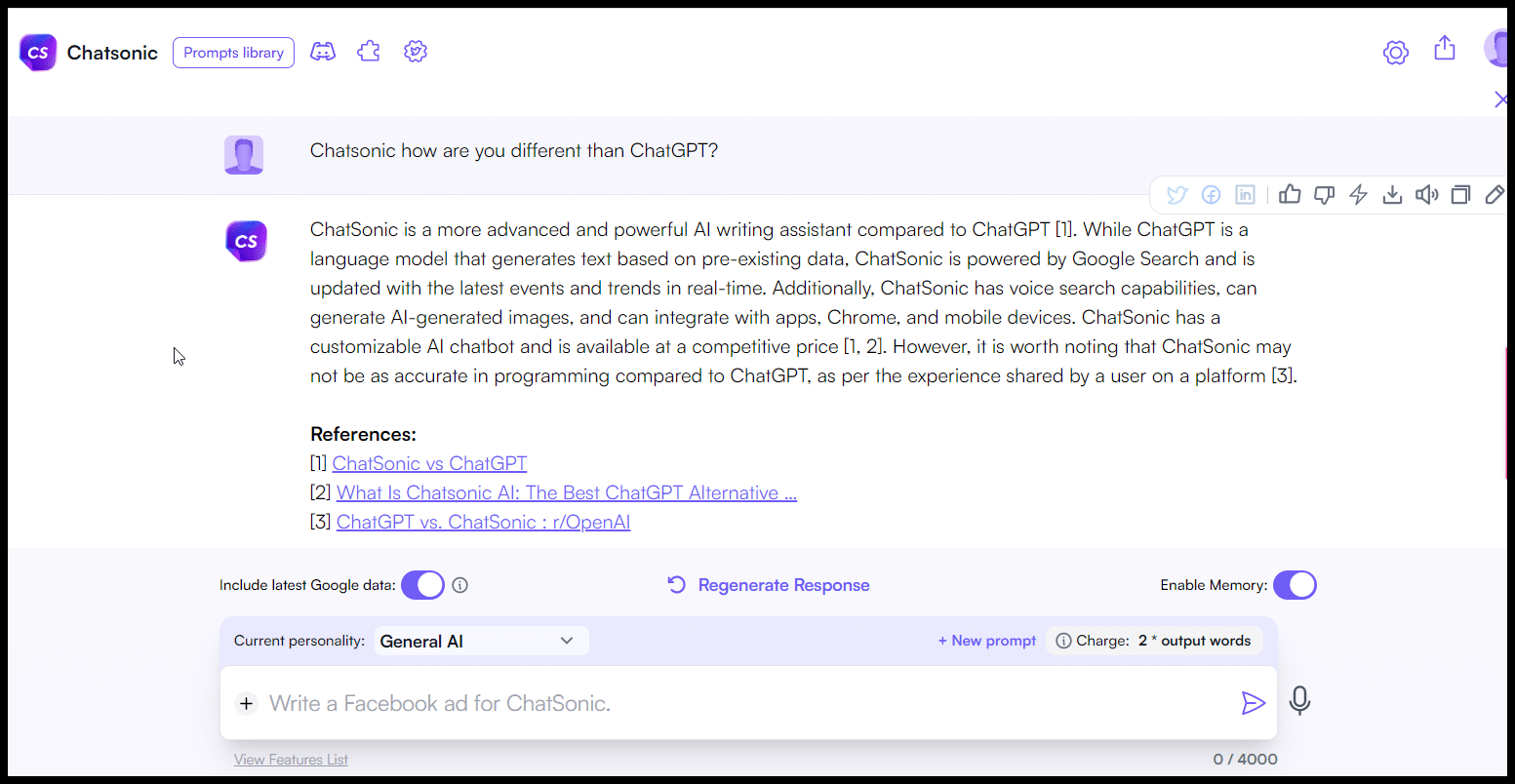
ChatSonic is a conversational AI built on top of GPT developed by Writesonic.
Why should you care?ChatSonic attempts to layer on a few specific features on top of ChatGPT:
If you’re willing to pay for a conversational AI product and want a product with access to the web and better “memory,” this would be worth trying out (you can trial the product for free).
5. Jasper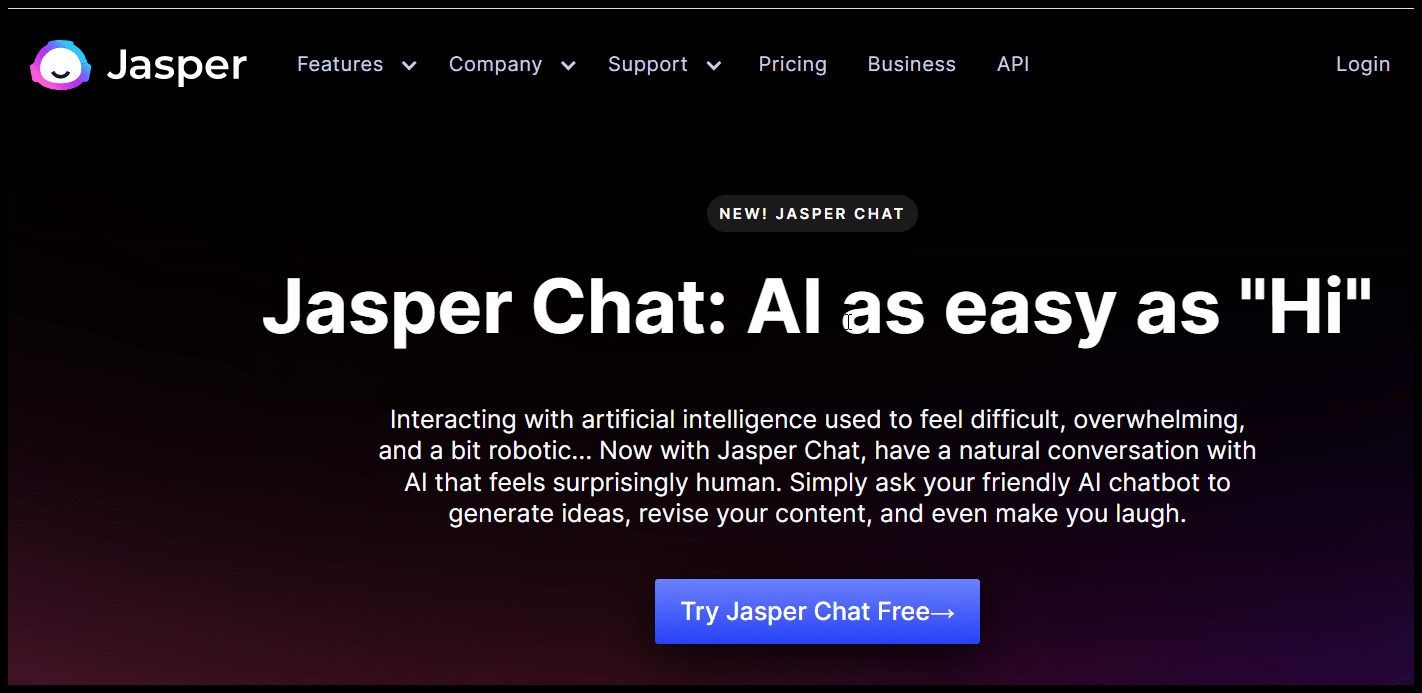
Jasper is a writing-focused AI platform built on GPT with a conversational chat-based AI tool.
Why should you care?Jasper is focused more specifically on writing tools than the standard chat products.
In addition to their chat product, they have templates for things like ad copy, landing page copy, headlines, blog posts, etc.
Who is it for?If you’re interested in AI content creation and are willing to pay for a product, Jasper is worth checking out (although a trial does require a credit card).
6. You.com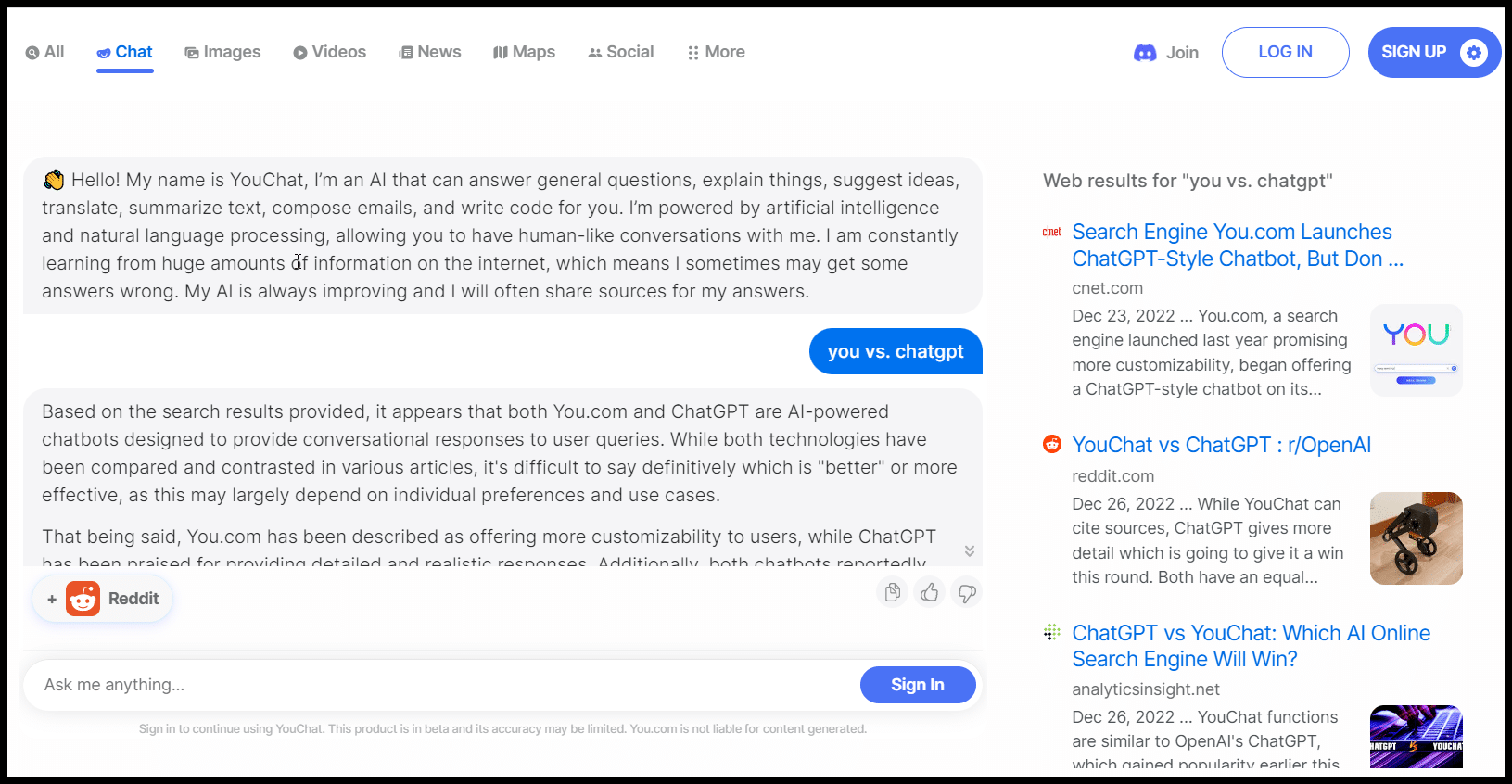
You.com is an AI-powered search engine that also features a chat product to help answer general questions with a combination of AI and links to the web.
Why should you care?You.com is a different approach than traditional chat products and could help find specific answers to certain questions.
Who is it for?This would be a research product for anyone interested in getting AI results blended with the web and finding answers to questions differently from Google.
7. ColossalChat
ColossalChat is built on top of Colossal AI, an open-source framework similar to GPT.
Why should you care?The fully open-source nature of the project (versus ChatGPT, owned by OpenAI and took on investment from Microsoft) and the fact that it’s developed on top of a different platform make this chat interesting.
Who is it for?Anyone interested in an open-source conversational AI product should check this out, as it’s easily accessible.
8. OpenAI Playground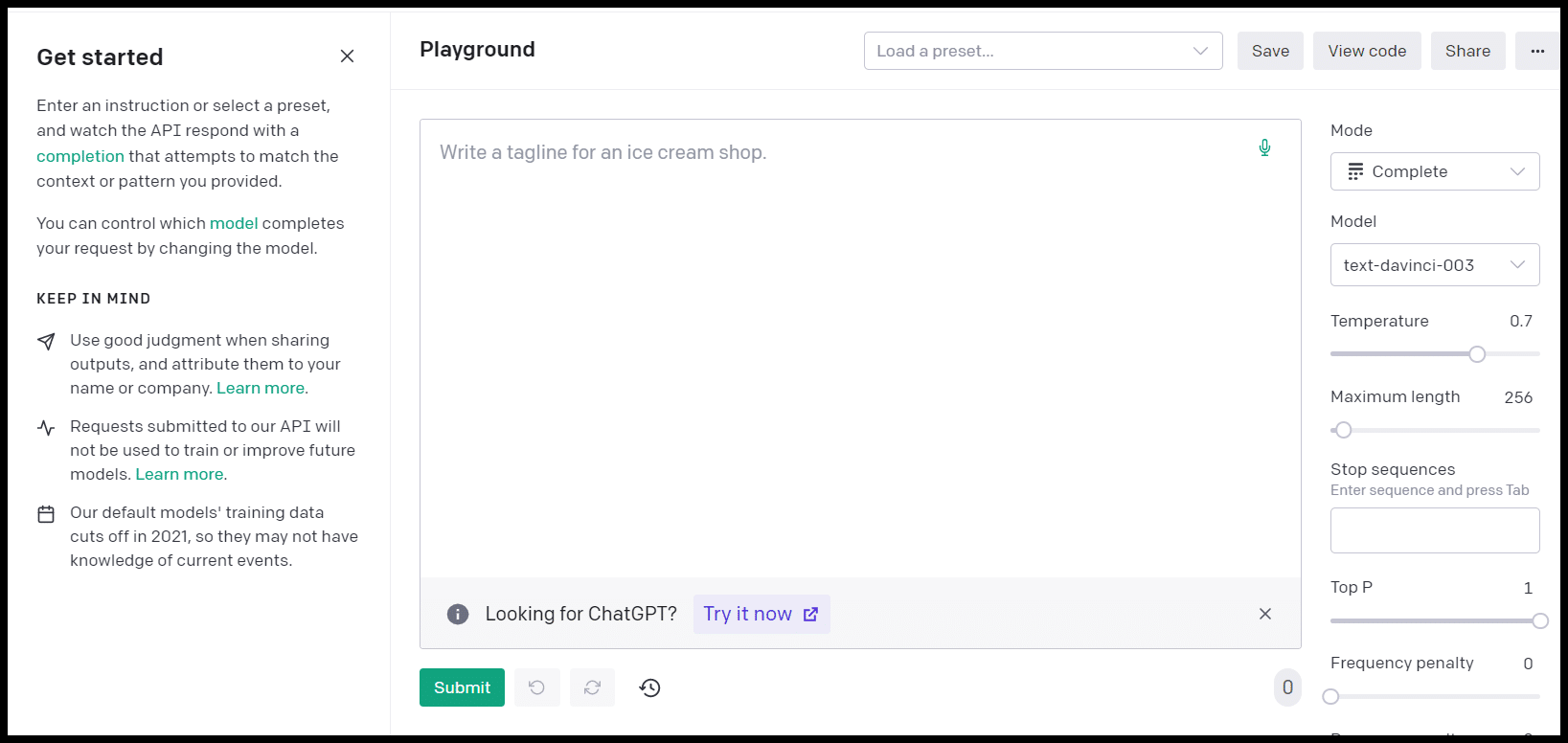
OpenAI Playground leverages the OpenAI API to offer similar functionality to ChatGPT, particularly a few versions of chat products with varying speeds and API costs built on Davinci 003.
Why should you care?OpenAI Playground can be a useful tool for testing specific functions or tasks on different tools within the playground.
Who is it for?This product can be interesting if you are considering using different OpenAI APIs and want to compare outputs based on different tools.
OpenAI offers $18 in free API usage, which can allow you to work through a number of prompts.
9. Perplexity AI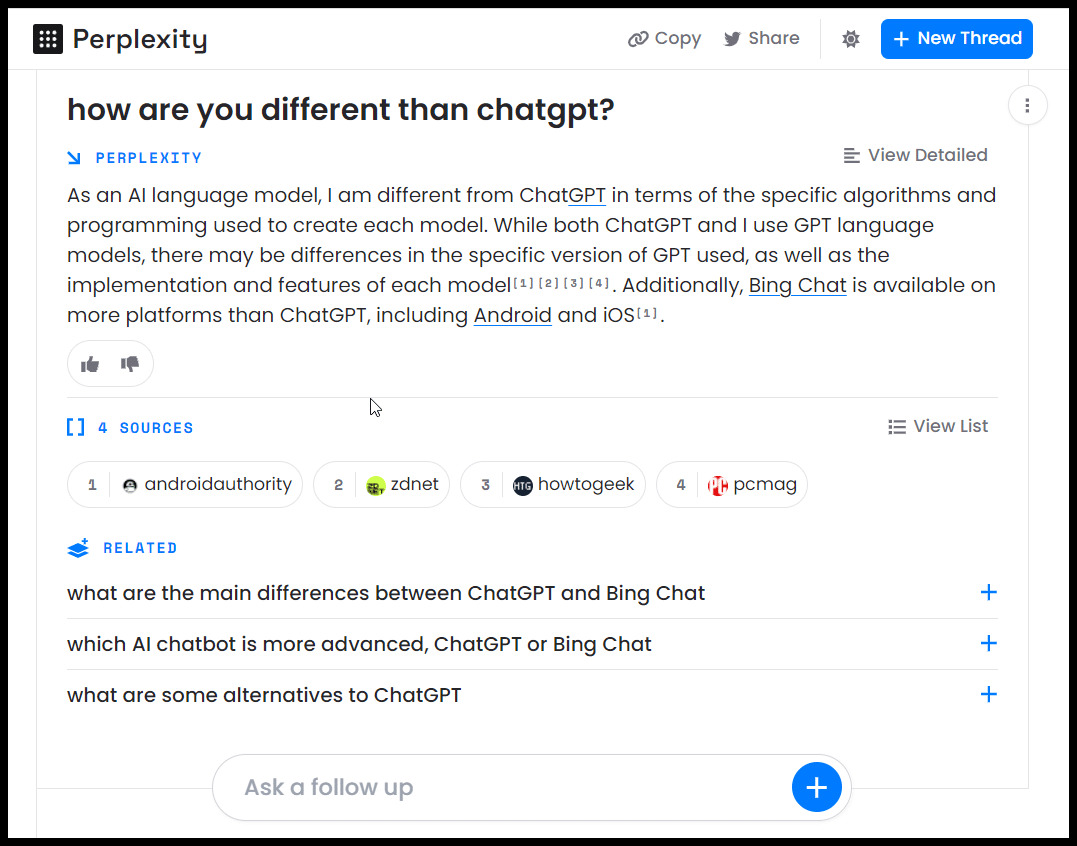
Like You.com, Perplexity AI is an AI-powered search engine combining conversational AI with citations to external sources.
Why should you care?Perplexity AI is a tool that takes conversational AI functionality and layers on links to external sources and related questions, making the outputs easy to share.
Who is it for?If you’re looking for a combination of AI and real-time data (for tasks like researching specific topics, building lists of recent news events, or researching fast-changing topics), this is a free tool worth checking out.
10. Caktus AI
Caktus AI is a student-focused AI product.
Why should you care?This will be interesting for SEOs and anyone creating content for the web as a great source of well-cited content, lists of citations, and ideas for free tools and widgets in informational content.
Who is it for?SEOs and people creating content for the web who are interested in using AI tools should check this (and similar products) out. You do need to create an account to use the product.
11. GitHub Copilot X
GitHub Copilot X is an AI coding assistant built on GPT-4, specifically designed to help debug and write code.
Why should you care?These task-specific tools can help with coding tasks – including if you're having issues with a free tool, WordPress or technical SEO.
Who is it for?Anyone doing a significant amount of coding should check out GitHub Copilot X.
12. Amazon CodeWhisperer
Amazon CodeWhisperer is a machine learning-powered coding companion allowing AI-powered coding assistance.
Why should you care?Point solutions that help with specific functions can layer on additional functionality over what ChatGPT can offer (like easy integration) for that specific function.
Given that Amazon built the tool and the prevalence of AWS, that's a reason to take note of.
Who is it for?This is worth checking out for developers interested in AI pair programming or coding companion tools.
13. Quora Poe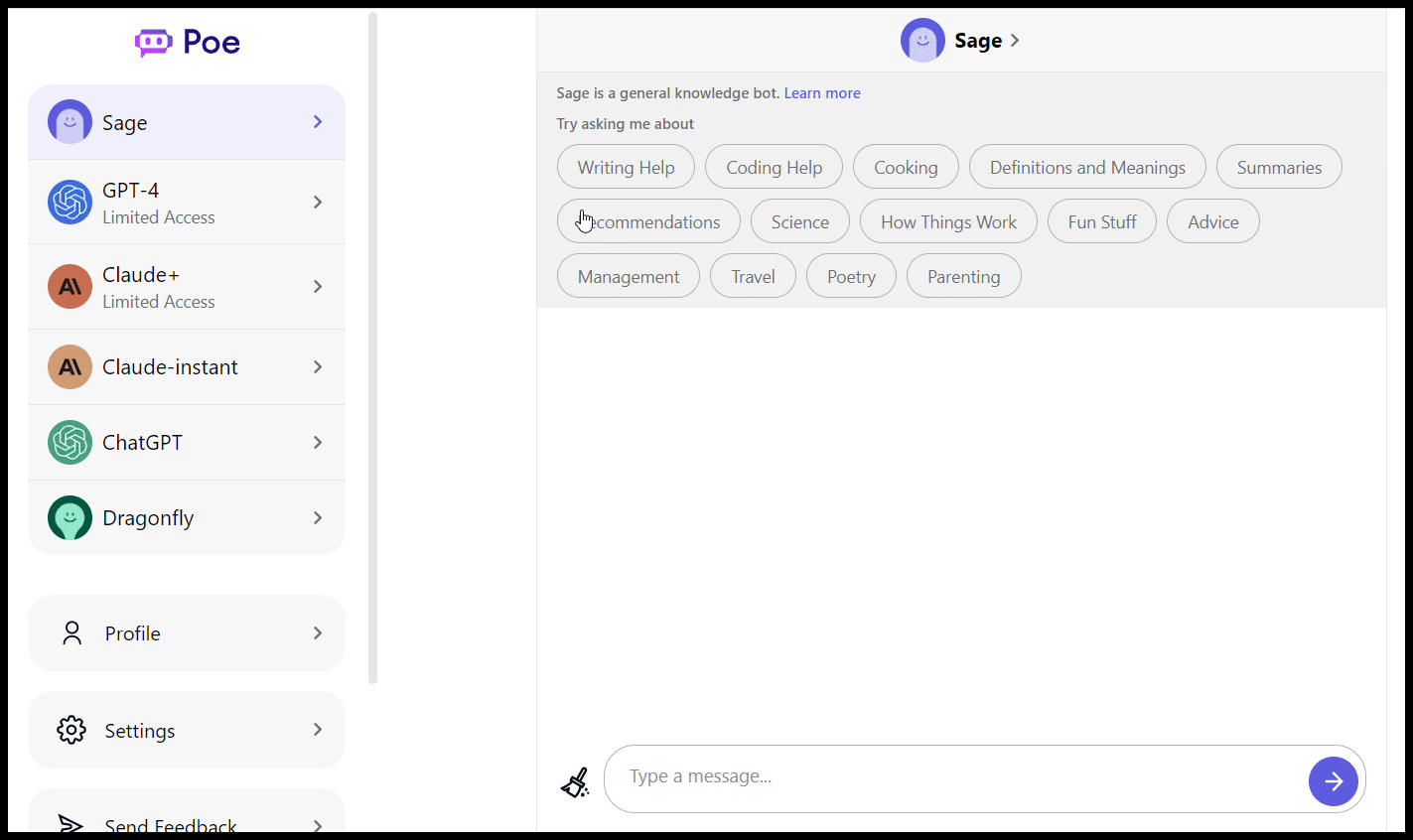
Quora Poe is a tool that offers a single interface with access to several AI-powered chatbots.
Why should you care?This is an interesting wrapper to let you quickly compare, contrast, and get answers from multiple AI-powered tools from one simple interface in a short period of time.
Who is it for?If you're looking for different ideas for layouts and data for a specific task, this can be a great way to quickly look at how the same task is performed across multiple AI platforms.
14. Koala

